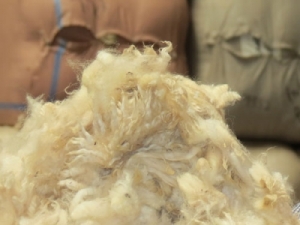Top wool advocate bales out
The conversion of productive farmland into trees has pretty much annihilated the wool industry.
 The high volume of short second shears eased slightly at the latest NZ Wool Services International's auction.
The high volume of short second shears eased slightly at the latest NZ Wool Services International's auction.
The high volume of short second shears eased slightly at the latest NZ Wool Services International's auction compared to the last North Island auction on May 12, says chief executive John Dawson.
Apart from that there were minimal changes.Of the 8,600 bales on offer 88% sold. Currency had minimal impact with the weighted indicator for the main trading currencies down only 0.47% week on week.
Dawson says the listed volumes of fine crossbred longer shears were 1 to 2% dearer with the shorter types firm to 2% easier.
Coarse crossbred fleece were firm to 2.5% dearer. Longer coarse shears were firm to 2% firmer with the high volumes of short shears on offer 1 to 2% easier.
Fine first lambs were firm to 3% dearer with coarse lambs 3 to 4% cheaper. Oddments were firm to 5% easier.
There are now quite disparate price levels between the limited type selection and styles in the North Island and the more varied offering from the South Island making direct comparisons difficult.
There was good competition with Australasia, Western Europe and United Kingdom principal, supported by Middle East, India and China.
The next sale on June 2 comprises about 6,500 bales from the South Island.
Mating wrapped up last month at the across-breed Beef Progeny Test on Pāmu’s Kepler Farm in Manapouri.
Libby Judson is a keeper of memories from an age gone by. Tim Fulton tells her story.
A New Zealand-first native tree study has highlighted the Bioeconomy Science Institute's position as a forestry research leader.
Hemp fibre processor Rubisco is relocating its core processing facility to Ashburton as part of a $20-$30 million expansion to leverage what it says is an accelerating global demand for sustainable and renewable fibres.
Tradition meets some of the latest in technology at the 2026 East Coast Farming Expo.
OPINION: Trade Minister Todd McClay and the trade negotiator in government have presented Kiwis with an amazing gift for 2026 - a long awaited and critical free trade deal with India.